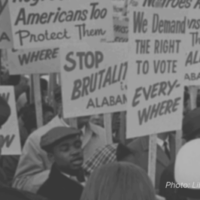Nationwide— In October, communities in Florida, Georgia, North Carolina, and beyond struggled with the devastation of hurricanes Helene and Milton, as the storms killed hundreds of people and wiped out homes and livelihoods. Amid the destruction, the Bureau of Labor Statistics reports that the national unemployment rate remained steady at 4.1% and 12,000 jobs were added. 7.0 million workers were unemployed.
The unemployment rate for Black workers was 5.7%, significantly higher than the 3.8% unemployment rate for white workers. Continuing disparities in unemployment rates are a result of structural racism, including persistent occupational segregation in the U.S. labor market and residential segregation that makes communities of color more vulnerable to climate-driven disasters.
“As climate change increases the frequency and intensity of storms, it is communities of color that often bear the brunt of the damage,” said Rebecca Dixon, president and CEO of the National Employment Law Project (NELP). “It is critical that workers get assistance to rebuild their lives. Policymakers must strengthen unemployment insurance (UI) and Disaster Unemployment Assistance (DUA), which supports workers who lost employment or self-employment as a result of a disaster but who are not eligible for regular unemployment benefits.”
In North Carolina, Governor Roy Cooper took action to support workers who saw their livelihoods lost or disrupted by the storm, signing an executive order to temporarily raise the state’s maximum unemployment benefit from $350 week to $600 a week and increasing benefits for all workers by $250 a week up to the $600 maximum. Governor Cooper has pushed for a permanent increase in North Carolina’s UI benefits, which are among the lowest in the nation, but the state legislature refused to act.
Many workers are not aware of DUA benefits. DUA assists workers—including people who are self-employed or work as independent contractors—who do not qualify for (or have exhausted) regular UI benefits and are unemployed as a direct result of a major disaster. NELP has called on Congress to reform DUA, including removing the restriction that requires unemployed workers from disaster areas to apply for unemployment benefits in hard-hit states rather than automatically qualifying for federally-funded DUA. Another critical area for reform is that both unemployment benefits and DUA exclude undocumented workers, leaving some of the most vulnerable and essential workers and their families without support.
In October, the unemployment rate for Latinx workers nationwide was 5.1%, the same rate as September. The unemployment rate for Asian workers fell to 3.9% from 4.1% in September.
The Unemployment Insurance Modernization and Recession Readiness Act, introduced by Senators Ron Wyden (D-OR) and Michael Bennet (D-CO) and Representative Don Beyer (D-VA) would complement DUA reform requiring the federal government to fund benefits that replace 100 percent of unemployed workers’ lost wages during a major disaster or public health emergency. The bill also sets nationwide standards for UI, mandating that states offer at least 26 weeks of unemployment benefits, raising benefit amounts to replace a greater share of workers’ prior earnings, and increasing coverage for part-time workers, temp workers, and workers whose earnings fluctuate over time. The bill also establishes a new, federally funded Jobseekers Allowance to support jobless workers who would not otherwise be covered by unemployment insurance and modernizes the Extended Benefits program that makes additional weeks of unemployment benefits available in times of high unemployment. State policymakers across the country should also act to improve their state unemployment insurance systems to better support workers and the economy.



